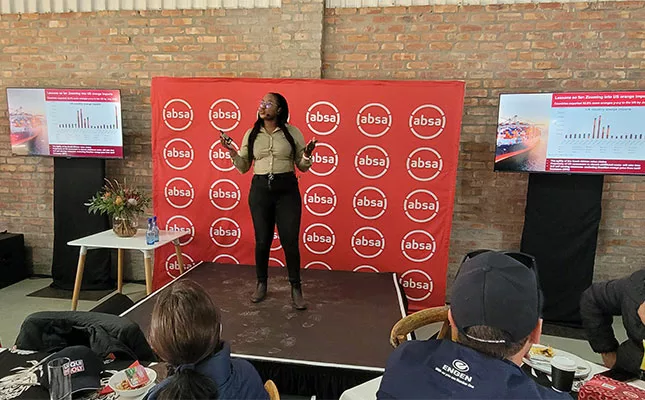
The signing of the Expropriation Bill into law by President Cyril Ramaphosa earlier in 2025 sparked lively debate on land reform and property rights. While some view it as a victory, others fear that it may undermine private property ownership.
In a Nation in Conversation session during Nampo 2025, a panel of experts examined the signing of the Act’s potential effects on property rights, land ownership, and the broader agricultural landscape.
Different interpretations of the law
Waldimar Pelser led the discussion that aimed to provide clarity on the Act’s provisions and its anticipated impact on commercial farming operations.
Although the topic of the discussion was understanding the implications of South Africa’s Expropriation Act on agriculture, it was clear that amongst the panel members and also the general public, there is no consensus on the understanding of certain aspects of the new law.
The panel members were Willem de Chavonnes Vrugt, deputy president of Agri SA; Dean McPherson, Minister of Public Works, and Infrastructure; Jaco Kleynhans, head of international liaison at Solidarity; Hermann Pretorius, Head of Strategic Communications at the South African Institute of Race Relations (IRR); and Theo Boshoff, CEO of Agbiz.
READ Expert insights on the Expropriation Act
According to McPherson, the new Act standardised the procedures in which expropriation could take place.
“The Act provides a uniform procedure that must be followed whenever expropriation takes place. It is an improvement on the 1975 Act which did not have the clauses and procedures guiding these processes. The Act exists to drive the economy and infrastructure development. It must be seen as a tool for economic development and growth.”
He also referred to the ‘nil-compensation’ provisions in Section 12(3), and said that in reality, nil compensation would be lawful under the Act.
Compensation is a delicate balancing act
According to Boshoff and De Chavonnes Vrugt, the ‘nil-compensation’ provisions are not as clear-cut as other elements contained in the Act, and are rightly the most controversial part of the law. Its impact is also the most difficult to predict, as compensation is not a simple equation; it is a delicate balancing of rights that will differ from case to case.
“Agri SA remains dedicated to protecting private property rights and fostering the growth and stability of South Africa’s agriculture sector. Agri SA actively participated in the Expropriation Bill drafting process, including Parliamentary and National Economic Development and Labour Council discussions, from 2013 to 2020. We have been involved in the process from the start and what we have now is a better option than what we started with,” said De Chavonnes Vrugt.
READ Expropriation Bill sparks concerns on land reform, food security
The Act facilitates the expropriation of land with no compensation under specific conditions in the public interest.
“While Agri SA is supporting the need for transformation and land reform in the agriculture sector, it must not come at the expense of the economy and investor confidence,” De Chavonnes Vrugt said.
Expropriation not an exception of property rights
According to Boshoff, Section 25 of the Constitution is commonly referred to as the property clause with the aim of safeguarding property rights from arbitrary deprivation.
The same rules apply to expropriation. Where the state requires private property for a public purpose or in the public interest, there must be a legitimate reason, and the reason must be contained in legislation.
“Expropriation is therefore not an ‘exception’, nor a ‘watering down’ of property rights because no expropriation can take place outside of the law or for an arbitrary reason,” Boshoff explained.
“The Act is a means to an end and not the end itself,” Boshoff said. “The Act provides that the state can only expropriate [property] if it has failed to buy the property on reasonable terms. It’s a deadlock-breaking mechanism that can only be used as a last resort. Expropriation is certainly not a ‘shortcut’ for the state to acquire property, as the procedures that the state must follow are far more onerous than buying the property in question.”
He further explained that in the case of expropriation, the normal verification process would still need to be followed to prove a valid claim before expropriation can take place.
“If it does, the provisions of the Expropriation Act will apply.”
According to McPherson, if the Expropriation Act was not enacted, the authority to expropriate property for various reasons would still exist.
“The difference is that the procedure contained in the old, 1975 Act would then be applied. This act predates the Constitution, and the process it prescribes is unlikely to pass constitutional muster.”
The Ministers pointed out that the Constitution requires compensation to be just and equitable, reflecting an equitable balance between the public’s interest and that of the affected parties.
“All relevant factors must be considered, but the overriding standard is still that the compensation must be just and equitable.”
If the reaction to the Act is anything to go by, there are clearly very different expectations surrounding this Act.
According to Boshoff, the real risk does not lie in nil compensation but in protracted and expensive litigation.
‘The possibility exists’
Kleynhans however, expressed concern with the wording in the Act and said that Solidarity does not like the processes described in the Act.
“It leaves the possibility that farm land can be expropriated and that litigation in this regard can take long to the detriment of the farmer.”
He said that according to Solidarity’s knowledge, South Africa is already experiencing disinvestments due to the Act.
Kleynhans stated that South Africa did not need expropriation for land reform. “There is land available to cater to those needs.”
“Court has been ‘innovative’ with water and mineral rights legislation”
Pretorius noted that there were a number of legal uncertainties in the current Act and referred to sections 8 and 13(2), while also pointing out the uncertainty around the 180 days allowed for the Constitutional Court to become involved.
He also said that he did not have confidence in the Constitutional Court, and described the court as being “innovative” in its application of water and mineral rights legislation.
“As far as we are concerned, that could be the same situation with land ownership.”
He also referred to the alternative Act that the IRR has created and invited the public to read it and give their comments.
McPherson concluded by acknowledging that there were aspects of the Act that are contentious and that created uncertainty.
“The contradictions can be addressed and solved. We can have discussions and provide answers and solutions that can be satisfactory to the vast majority of people. I encourage discussions and hearing the different points of views as these opens up the floor for finding common ground and working towards finding solutions.”
Get trusted farming news from Farmers Weekly in Google Top Stories.
➕ Add Farmers Weekly to Google ✔ Takes 10 seconds · ✔ Remove anytime






